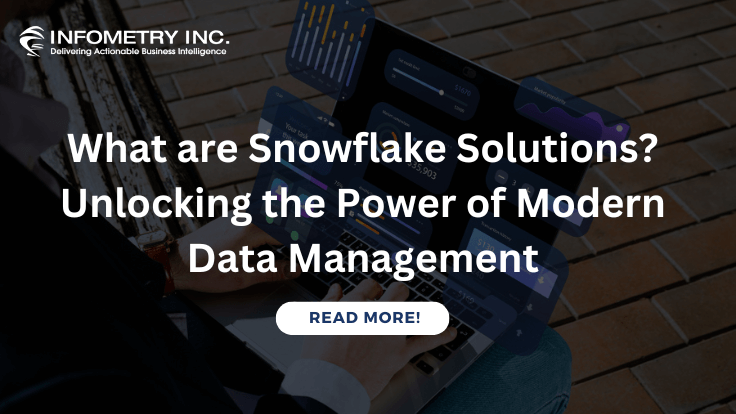
The Significance of Data Analytics Infrastructure
May 16, 2024
Exploring Snowflake’s Data-Sharing Capabilities
June 4, 2024In the contemporary landscape of data-centric operations, organizations face an overwhelming influx of information daily. Effectively extracting value from this data necessitates a sophisticated and dynamic approach. Herein lies the significance of Master Data Management (MDM), a pivotal strategy aimed at consolidating and harmonizing core business data throughout the enterprise. Nonetheless, conventional MDM solutions often prove cumbersome and inadequate in adapting to the constantly shifting data environment. This is precisely where Intelligent MDM emerges as a transformative force, revolutionizing the way organizations manage and leverage their data assets.
Understanding Intelligent MDM:
Master Data Management (MDM) has long been integral to enterprises seeking to consolidate, cleanse, and govern their critical data across various systems and platforms. However, traditional MDM approaches often struggle to keep pace with the dynamic nature of modern data ecosystems. Enter Intelligent MDM, a paradigm shift empowered by advanced technologies like artificial intelligence (AI), machine learning (ML), and cloud computing.
Intelligent MDM goes beyond mere data consolidation, offering cognitive capabilities to understand, analyze, and derive insights from data in real time. By leveraging AI and ML algorithms, Intelligent MDM platforms can autonomously cleanse data, detect patterns, and even predict future trends, empowering businesses to make informed decisions swiftly.
Infometry: Redefining Data Management with Intelligence:
In the realm of Intelligent MDM, Infometry emerges as a trailblazer, delivering cutting-edge solutions that harness the full potential of cloud-native technologies. With a rich portfolio of services tailored for diverse industries, Infometry empowers organizations to unlock the value of their data assets seamlessly.
Key Features and Benefits:
Scalability:
Infometry’s cloud-native architecture ensures elastic scalability, allowing businesses to handle growing volumes of data without compromising performance or reliability.
Data Quality and Governance:
Through AI-driven data cleansing algorithms, Infometry ensures data integrity and compliance with regulatory standards, fostering trust and confidence in organizational data assets.
Real-time Insights:
Leveraging advanced analytics capabilities, Infometry enables businesses to extract actionable insights from their data in real time, empowering agile decision-making and strategic planning.
Integration Flexibility:
Infometry seamlessly integrates with existing IT infrastructures and cloud ecosystems, ensuring compatibility and interoperability across diverse platforms and applications.
Cost Efficiency:
By eliminating the need for on-premises hardware and infrastructure maintenance, Infometry helps businesses reduce IT overheads and achieve cost efficiencies, maximizing ROI.
Use Cases and Success Stories:
From retail and healthcare to finance and manufacturing, Infometry’s Intelligent MDM solutions have catalyzed digital transformation across various industries. Case studies abound with instances of streamlined operations, enhanced customer experiences, and accelerated innovation facilitated by Infometry’s innovative approach to data management.
Retail Revolution:
In the retail sector, Infometry’s Intelligent MDM platform enabled a global e-commerce giant to unify customer data from disparate sources, leading to personalized marketing campaigns and a significant increase in sales conversions.
Healthcare Innovation:
In healthcare, Infometry’s data governance capabilities helped a leading hospital network ensure compliance with HIPAA regulations while optimizing clinical workflows and improving patient outcomes through data-driven insights.
Financial Empowerment:
For financial institutions, Infometry’s real-time analytics capabilities facilitated fraud detection, risk management, and personalized financial services, driving customer satisfaction and loyalty.
Supply Chain Optimization:
Streamline inventory management and logistics by consolidating supplier and product data for improved forecasting and operational efficiency.
Regulatory Compliance:
Ensure adherence to industry regulations and standards (e.g., GDPR, HIPAA) through centralized data governance and audit trails.
Advantages of MDM:
Data Consistency:
Ensures uniformity and accuracy of data across systems, reducing errors and redundancies.
Improved Decision-Making:
Provides a single source of truth for data, enabling informed and strategic decision-making.
Enhanced Customer Experience:
Enables personalized customer interactions and targeted marketing campaigns by consolidating and analyzing customer data.
Operational Efficiency:
Streamlines business processes and workflows by integrating and harmonizing data from disparate sources.
Disadvantages of MDM:
Complex Implementation:
Requires significant planning, resources, and time for deployment and integration across various systems.
Costly:
Initial setup costs and ongoing maintenance expenses can be substantial, especially for large-scale implementations.
Resistance to Change:
Organizational resistance and cultural challenges may hinder adoption and acceptance of new data management practices.
Data Security Risks:
Centralizing data increases the potential impact of security breaches or data leaks, necessitating robust security measures.
Conclusion:
As organizations navigate the complexities of the digital landscape, Intelligent Master Data Management emerges as a beacon of innovation, empowering businesses to harness the full potential of their data assets in the cloud. At the forefront of this transformative journey stands Infometry, with its visionary approach to data management and commitment to driving organizational excellence through intelligence, agility, and innovation. With Infometry as a trusted partner, businesses can embark on a transformative path towards data-driven success in the digital age.




